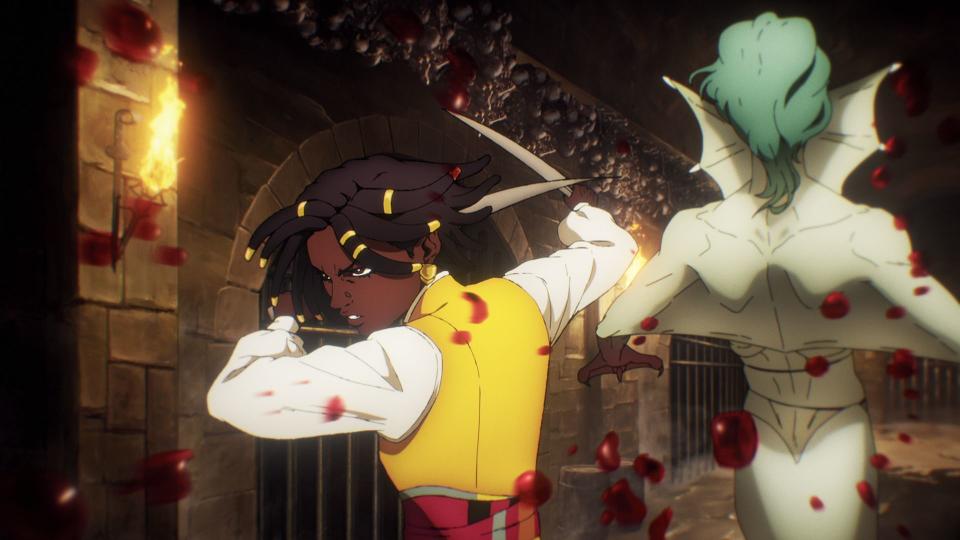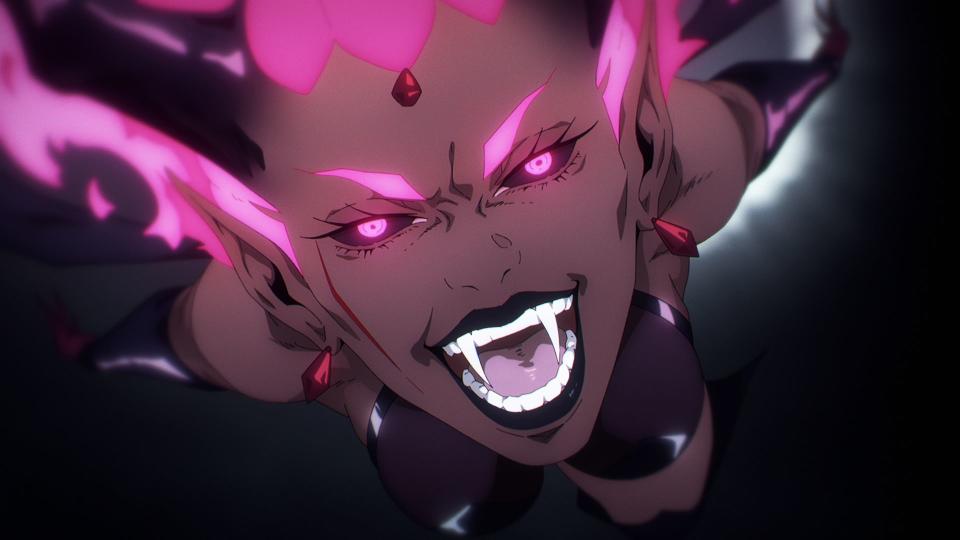Castlevania: Nocturne review: "Could be more fearsome than its Netflix big brother – if it shows more bite"

- Oops!Something went wrong.Please try again later.
I don’t need to be Psycho Mantis to know you’re probably here because you’re a fan of Castlevania. If so, you’ll be pleased to know that Nocturne, the centuries-later-set spin-off to the original anime series, mostly does justice to the iconic bloodsucking franchise, transplanting the hack-and-slash (or, rather, whip-and-crack) occult adventures of the Belmonts to a brand-new location – with similar results.
Set against the backdrop of revolution, firstly in Tea Party-era Boston and then in late 18th-century France, Castlevania: Nocturne remixes elements of 1993’s Rondo of Blood and sees a gang of vampire hunters, sorcerers, and magic users band together to stave off the imminent arrival of the Vampire Messiah.
So far, so very Castlevania – including a familiar family name. The cocksure Richter Belmont (Edward Bluemel), complete with trademark whip, leads the pack, though Nocturne soon finds more interesting story threads to pull elsewhere – with the protagonist often fading into the background. It doesn’t help, either, that Bluemel takes a little time to grow into the role, often tripping on the admittedly difficult high-wire act of sounding both smug and sincere whenever the situation calls for it.
The youngster is joined by firebrand summoner Maria (Pixie Davies), sorceress Annette (Thuso Mbedu), and the criminally under-utilized Edouard (Sydney James Harcourt), a singer from the island of Saint-Domingue who stands alone as Nocturne’s most captivating and tragic figure.
Let them eat stake

Together, they uncover a conspiracy involving the church, aristocracy, and a willing brood of night-dwellers, one that eventually unravels into something that holds world-ending consequences if not properly dealt with. Thankfully, they have Richter’s 'auntie' Tera (Nastassja Kinski) in tow ("a third cousin a thousand times removed," Richter jokes, perhaps winking towards the Belmonts’ unwieldy family tree) to be the glue that holds this motley crew together.
Alongside the engaging dynamic between the group, Castlevania: Nocturne also makes good use of its new setting, offering up a warmer color palette than its Gothic counterpart. The rich yellows and oranges help create a sense of religious wonder – an undeniable boon to a show that revels in foes both godly and ungodly alike, including the vampire who murdered Richter’s mother.
While it’s likely you’ll find yourself wishing the fang-tastic Dracula was still around, Olrox (Zahn McClarnon) is certainly a worthwhile replacement. The cold, calculating 'Aztec' sexes up what is a relatively chaste season by Castlevania standards, all while providing a little more depth to the tired trope of vampires simply being agents of evil – even if I had a wry chuckle out of the elites literally sucking the French peasantry dry, a pitch-perfect political statement if ever I saw one.
Unfortunately for Nocturne, its ultimate Big Bad – the Vampire Messiah – only ever operates on the edges of the story, only emerging long after they should have sunk their teeth into the narrative.
Fangs but no fangs

Thanks to the Messiah’s decision to stick to the shadows to let other, less intriguing characters do their bidding, Castlevania: Nocturne commits the cardinal sin of modern television: saving itself – and seemingly its budget – for an epic closing stretch. In this case, a sizzling finale that sees all its major players converge in an all-out war that puts the rest of the season to shame.
While it certainly ends on a high note, it does leave everyone feeling a little undercooked elsewhere; major family revelations are dropped without warning, often landing without the desired impact.
In truth, the show’s structure is wonky and lopsided throughout – best evidenced by Nocturne taking only three episodes before devoting itself entirely to a flashback even if it is, undoubtedly, a touching and tender detour back to Annette’s earlier days. 10 episodes would have served the show better and would have gifted everyone a chance to be fleshed out a little more.
Speaking of flesh, it’s disappointing that the first half of Nocturne’s action scenes are patently lacking in the red stuff, a claret-spilling assault at a chateau aside. Heads are lopped off aplenty, sure, but Castlevania’s selling point has always been its no-punches-pulled gore. Some fight scenes further in are suitably gnarly, though the bloodletting (and blood-pumping fights) arrive a little too late to perhaps capture the attentions of a fresh audience.
Nocturne, then, is an inconsistent, frustrating, but ultimately entertaining affair – ending just as it hits its stride and ups the stakes considerably, pun most definitely intended. Couple that with a fist-pump of a moment that will have many thirsting for a second season and there’s every chance that – if it shows a little more bite – this Castlevania spin-off could become even more fearsome than its big brother.
Castlevania: Nocturne is now streaming on Netflix. For more, check out the best Netflix shows and best Netflix movies you should be watching right now.

